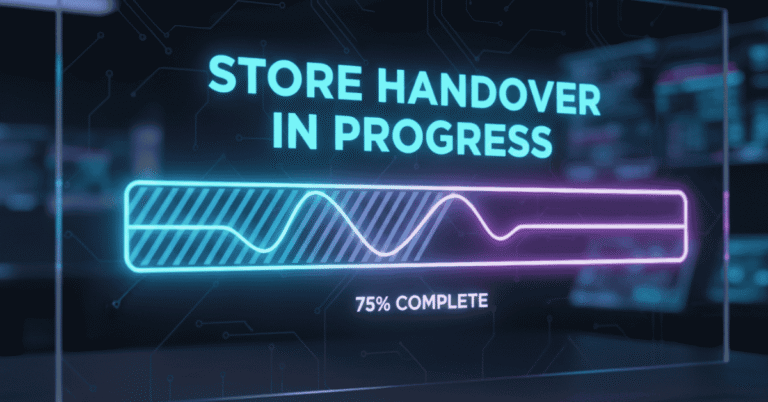So, you’re thinking about stepping into online business ownership.
Exciting? Absolutely.
A little overwhelming? Yeah… that too.
There’s this moment — right at the beginning — where everything feels big. There’s so much to figure out, and sometimes a term you’ve never heard before pops up.
One of those terms that doesn’t get talked about enough — but really should — is – Ecommerce business transition questions.
Kind of formal-sounding, right? Maybe even a little confusing at first. But don’t let that stop you — it’s really just about making sure you’re prepared for what’s ahead.
If you’re buying a store or taking over an existing ecommerce business, this becomes even more important. Because you’re not starting from scratch — you’re stepping into something that already has moving parts: customers, suppliers, systems, and maybe even problems you haven’t seen yet.
And the way you approach that transition sets the tone for everything.
Knowing what to ask — and when — helps you spot red flags before they turn into expensive surprises. It shows you where the business is strong, where it needs work, and what’s truly happening behind the numbers. As it gives you a real picture of what you’re stepping into — not just on paper, but in practice.
It’s not a quiz. There’s no perfect answer.
It’s about being thoughtful, curious, and one step ahead.

These questions open new levels — they’re your guide. They help you move forward without losing direction, keeping your steps clear instead of drifting off course. As it marks the beginning of sharper decisions and a smoother path toward building your own ecommerce business.
So let’s dive in.
Table of Contents
What are Ecommerce Business Transition Questions?
E-commerce business transition questions are the key questions you ask when stepping into ownership of an online store — whether you’re buying a new business or taking over an existing one. These questions help you understand how the business truly functions, from daily workflows and marketing efforts to finances and supplier relationships.
Asking them shows that you’re taking ownership seriously. It protects your investment, builds insight, and helps you take control with certainty. Simply put, the better your questions, the easier your transition will be.

Essential 100 Ecommerce Business Transition Questions to Ensure a Smooth Handover
1. Ecommerce Business Transition Questions : Daily Operations
Before diving in, it’s essential to know what your everyday responsibilities will look like.
1. What does a typical day look like in running the business?
Understanding the daily flow helps you manage your time effectively and ensures you don’t miss critical tasks.
2. How do you manage order fulfillment from start to finish?
Learning the full order process — from purchase to delivery — prevents delays, errors, or unhappy customers.
3. What tools or software do you use for operations?
Knowing which systems keep things running avoids confusion and helps you maintain a smooth workflow.
4. How do you handle returns, refunds, or complaints?
Getting clarity on this builds confidence in your ability to handle issues professionally and protect your brand reputation.
5. Are there any recurring operational issues I should be aware of?
Awareness of common challenges lets you prepare solutions before problems arise.
6. What tasks take up most of your time daily or weekly?
This reveals where you might automate or delegate to save time.
7. Who manages operations when you’re unavailable?
Understanding the backup plan ensures business continuity during your absence.
2. Ecommerce Business Transition Questions : Supplier & Inventory Management
Your supplier network and inventory systems are the framework of your store.
1. Who are the main suppliers, and what are their contact details?
Having their information ensures smooth communication and uninterrupted product flow.
2. How often should I place orders, and what’s the reorder process?
Knowing this helps you maintain stock balance without overspending.
3. Are there minimum order quantities or special terms with suppliers?
Clear terms prevent financial surprises or misunderstandings later.
4. How do you track inventory levels, and what software do you use?
Efficient inventory tracking avoids overselling and ensures accurate stock updates.
5. Are there any suppliers you recommend avoiding or who are unreliable?
This insight helps you dodge bad partnerships and potential delivery issues.
6. How reliable are delivery timelines from each supplier?
Understanding delivery consistency prepares you for seasonal or shipping delays.
7. Do you have backup suppliers for critical products?
Having alternatives ensures your store never runs out of bestsellers.
3. Ecommerce Business Transition Questions : Financials & Accounting
The financial foundation determines your store’s stability and growth potential.
1. How do you track revenue, expenses, and profits?
Proper tracking gives you a clear picture of performance and profitability.
2. Are there any subscriptions, recurring costs, or vendor payments I should know about?
Awareness of ongoing costs prevents budgeting shocks later.
3. How do you handle taxes and filing requirements?
Understanding this ensures compliance and avoids penalties.
4. Are there any unpaid invoices, pending refunds, or debts?
Transparency around outstanding payments protects you from hidden liabilities.
5. What’s the average monthly cash flow pattern?
This helps you plan for slower months and manage finances smartly.
6. Do you use any accounting or automation tools?
Knowing the tools helps you maintain efficiency and reduce manual work.
4. Ecommerce Business Transition Questions : Marketing & Ad Accounts
Marketing is where your store’s visibility and customer engagement truly begin.
1. Which marketing channels are active (Facebook, Google, Instagram, email, etc.)?
Knowing this helps you maintain consistent performance and avoid losing traffic.
2. Can you walk me through current ad campaigns and budgets?
Understanding campaign structure ensures your ad spend is optimized.
3. What has historically worked and what hasn’t?
Learning from past campaigns helps you plan smarter future strategies.
4. How do you track conversions and ROI?
Knowing the tracking method ensures you can measure performance accurately.
5. Are there any banned or restricted accounts?
Being aware prevents unexpected access loss.
6. How do you test new ad creatives or campaigns?
This helps you understand the brand’s experimentation process and marketing agility.
7. What’s your average customer acquisition cost (CAC)?
Knowing CAC helps you determine real profitability and scalability.
5. Ecommerce Business Transition Questions : Customers & Support
Happy customers are the heartbeat of any successful store.
1. Who are the top customers or recurring buyers?
Recognizing loyal customers helps in nurturing relationships and encouraging repeat purchases.
2. What is the typical customer support process?
Knowing this ensures smooth communication and a consistent service standard.
3. Are there scripts or templates for handling inquiries?
Templates save time and keep communication professional.
4. How do you manage negative reviews or complaints?
Understanding this maintains trust and protects your brand image.
5. What’s the most common customer complaint or question?
This insight helps improve the shopping experience and prevent recurring issues.
6. How do you collect and use customer feedback?
Customer insights are valuable for refining products and marketing approaches.

6. Ecommerce Business Transition Questions : Technology & Accounts
Behind every seamless store lies a well-structured tech ecosystem.
1. Can you provide access to all accounts (Shopify, WooCommerce, email, ad accounts, analytics)?
Having full access ensures you can operate without disruption.
2. How do you manage passwords and account security?
Good security habits protect you from unauthorized access and data loss.
3. Are there any tools or plugins critical to the business’s operation?
Knowing essential integrations ensures nothing breaks post-handover.
4. Do you have documentation for all integrations and automations?
Documentation simplifies troubleshooting and scaling later.
5. How often do you update plugins or software?
Regular updates keep your store secure and functioning smoothly.
7. Ecommerce Business Transition Questions : Growth & Strategy
This is where you turn ownership into expansion.
1. What are the current growth opportunities?
Understanding potential markets helps in scaling strategically.
2. Which products or categories perform best?
Focusing on bestsellers drives faster profitability.
3. Are there seasonal trends to consider?
Recognizing patterns helps in planning promotions and inventory cycles.
4. Any strategies you would have done differently in hindsight?
Learning from past mistakes accelerates your improvement curve.
5. What new markets or products were next on your roadmap?
Exploring these ideas can help you expand beyond current limits.
6. How do you track and evaluate overall business performance?
Having clear metrics keeps your progress measurable and actionable.
8. Ecommerce Business Transition Questions : Legal & Compliance
Legal clarity protects your investment and ensures peace of mind.
1. Are there any legal obligations or licenses to maintain?
Understanding compliance requirements prevents penalties.
2. Are there any contracts or agreements with suppliers or partners?
Knowing your contractual commitments avoids future conflicts.
3. Any past disputes or pending issues?
This ensures transparency and protects you from unforeseen legal trouble.
4. Are there upcoming regulatory changes that may affect the business?
Staying informed keeps you ahead of compliance updates.
5. Who manages legal or compliance matters — in-house or outsourced?
Knowing this helps you plan who to contact for future legal needs.
Buying or transitioning into an eCommerce business goes outside of managing the business. It means understanding every moving part before you take the wheel. Asking these questions builds awareness, reduces risk, and gives you the clarity to grow confidently from day one.
Before You Go
Stepping into a new chapter takes more than courage — it’s about clarity of vision. Treat every question as a framework revealing the rhythms and weak points of the business. Your curiosity shapes informed actions, enabling deliberate, precise choices rather than impulsive leaps.
Progress happens in measured steps: gather facts, test assumptions, and iterate. Minor insights — a supplier nuance, a customer pattern, a process tweak — compound far more effectively than grand strategies. Document observations and let evidence guide your next move.
Uncertainty is inevitable, but it doesn’t have to dictate outcomes.
Ultimately, success comes from a disciplined, evidence-driven approach. Stay attentive, methodical, and let the framework of insights drive forward momentum.
FAQs On Ecommerce Business Transition Questions
1. How Can You Prepare Yourself Before the Ecommerce Business Transition Begins?
Before the transition starts, take time to understand the business fully. Look at past reports, learn who the main suppliers are, review how orders are fulfilled, and check customer feedback. Make a list of anything you do not understand and ask the seller during the handover. Preparing early will help you feel more confident and avoid confusion once you take control.
2. How Do You Know Which Questions to Ask During the Handover?
Start with the basics and then go deeper. Ask about daily operations, tools or software used, and who the key suppliers are. Then explore customer support, marketing campaigns, and financial systems. Focus on anything that affects daily work or revenue. It is always better to ask twice than to assume once. Asking the right questions now will save you time and mistakes later.
3. How Long Should Your Transition Period Last?
Most sellers provide two to four weeks of support when you take over a store. During this time, watch, learn, and take notes on how everything is managed. Ask for demonstrations and clear explanations for each process. Treat this period as training for running the business. The more attention and care you give now, the smoother your first few months will be.
4. What Should You Do If the Seller Does Not Provide Enough Guidance?
If the seller is not very helpful, stay calm and professional. Keep a record of your questions and any answers you receive. You can also hire a short-term consultant to guide you. The key is to avoid taking over blindly. Getting clarity before you fully take control will prevent mistakes that could cost money, time, or customers later.
5. How Can You Make the Transition Smoother Once You Take Over?
After you take control, spend some time observing before making big changes. Review supplier communications, check marketing data, and make small updates carefully. Keep notes from the seller as a reference. Transitioning is not about being perfect from day one. It is about learning, adjusting, and gradually making the business your own while building confidence along the way.


